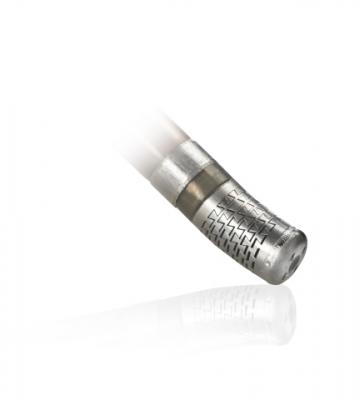
Image courtesy of St. Jude Medical.
January 22, 2015 — St. Jude Medical Inc. announced the first patient enrollment in the STAR-VT (Substrate Targeted Ablation using the FlexAbility Ablation Catheter System for the Reduction of VentricularTachycardia) clinical trial, a prospective, multi-center, randomized study evaluating the safety and efficacy of the FlexAbility ablation catheter in ventricular tachycardia (VT) ablation procedures. The STAR-VT trial will assess whether combining targeted ablation with either an implantable cardiac defibrillator (ICD) or cardiac resynchronization therapy defibrillator (CRT-D) can reduce the incidence and economic burden of recurring ventricular arrhythmias better than treatment with either an ICD or CRT-D and medication alone.
“For many years, implantable cardioverter defibrillators have been one of the primary treatment options for patients with ventricular arrhythmias,” said Andrea Natale, M.D., executive medical director at the Texas Cardiac Arrhythmia Institute. “While these are life-saving therapies, patient risks associated with the recurrence of ventricular tachycardia, such as frequent shocks from an implantable defibrillator, still exist. This study is important because it may provide further evidence that ablation therapies are more effective than medication in suppressing recurring ventricular tachycardia and with it the freedom from shocks and repeat cardiovascular hospitalizations for my patients.”
Patients who have ventricular tachycardia — an abnormal rapid heart rhythm that originates from the lower pumping chambers of the heart — may not be able to maintain a normal blood pressure because of the heart’s inability to effectively pump blood throughout the body. If a normal heart rate is not restored, patients may experience episodes of loss of consciousness, or even sudden cardiac death. An ICD or CRT-D detects this abnormal heart rhythm and delivers a small shock to the heart that is intended to restore a normal rhythm. Today, ICDs and CRT-Ds are an effective treatment option for nearly all patients with life-threatening ventricular tachycardias, but patients with recurring symptoms may need adjunctive treatment options, such as catheter ablation or medication, to prevent the heart from going into VT.
The STAR-VT trial will enroll an estimated 1,450 patients at approximately 50 centers in the United States. International centers will also be included in the trial. All patients will receive an ICD or a CRT-D and will then be randomized 1:1 to either adjunctive treatment (ablation therapy) or control (routine drug therapy) groups. The anticipated enrollment duration is four to five years. The STAR-VT trial will evaluate the number of ICD or CRT-D interventions after one year post-procedure as well as the incidence of serious adverse events associated with catheter ablation within 30 days following the procedure. Other secondary endpoints will assess the reduction of emergency room visits and mortality rates for patients involved in the trial.
The FlexAbility ablation catheter, which will be used for ablation as indicated in the STAR-VT study, combines a unique, irrigated flexible catheter tip with a state-of-the-art handle and catheter design. The next-generation flexible tip technology was designed to reduce complications associated with ablation procedures through its ability to bend and conform to the cardiac anatomy, decreasing the amount of pressure distributed to a patient’s heart wall while simultaneously increasing the stability of therapy delivery. The EnSite Velocity Cardiac Mapping System will be used in the trial to create the heart geometry and provide information for detection and diagnosis of abnormal heart rhythms in order to assist physicians in the targeting of ablation.
For more information: www.sjm.com


 January 05, 2026
January 05, 2026 









